The European Union commitment not to transfer the AMISOM Burundian contingent salaries through Treasury coffers makes Bujumbura government anxious. Is it a false alarm or does Burundi want to take another shocking decision?
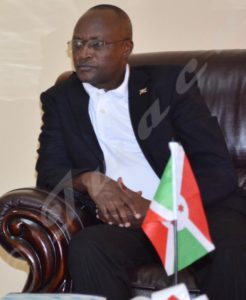
Gaston Sindimwo “Burundi must pay its own civil servants as well as its military forces. We are not in Somalia as mercenaries.”
“We must inform ourselves and inform people on international conspiracy aiming to discredit our policemen and soldiers deployed in peacekeeping missions abroad, while it is a sacrifice they make, often risking their life. So, it looks like the international community think that Burundi depends on these salaries given to soldiers while many of them lose their lives and the country gains nothing.” This is the guidance given by Pascal Nyabenda, the speaker of the national assembly to MPs on Wednesday, 2 November 2016 at Kigobe.
The following day, a session of oral questions was scheduled for Ministers of Public Security and National Defense in the Lower Chamber of Burundi Parliament. “Both Ministers must prove to us that there is no connection between the money and the mission that our forces are performing at the cost of great sacrifice. MPs should ask the government the reason why the international community wants to discredit Burundian contingent so that, if necessary, the latter be withdrawn from these missions or stay there, “said Nyabenda.
The European Union, which finances almost all troops salaries in peacekeeping mission in Somalia, has decided to no longer channel the salaries of 5500 soldiers of the Burundi contingent deployed for AMISOM forces in Somalia, that is, about € million per month – for the Treasury coffers because of the sanctions it has taken against the Government of Burundi since last March. The EU accuses Bujumbura of multiple violations of human rights and a refusal to negotiate with the opposition. Otherwise, it has decided to tighten financial sanctions.
Conspiracy once again….
On 21 October 2016, the first Vice-President, Gaston Sindimwo, strongly reacted on RFI radio about the decision of Brussels. For him, the EU is seeking once again, to divide the regime and its army, and to cause discontent among the troops: “It is a gesture which is a continuation of destabilizing Burundi, something we have been denouncing since long ago. Burundi must pay its own civil servants as well as its military forces. We are not in Somalia as mercenaries, but because it is a friend African country to help it stand up as we were helped in the past. ”
The EU may be considering to pay the salaries of AMISOM Burundian soldiers directly on their accounts, what Sindimwo deems unacceptable: “No country in the world can accept that one pays its employees, because they would no longer be its civil servants. This is unacceptable, whether it is the AU or the EU. “The first Vice-President of Burundi does not exclude the withdrawal of Burundian troops from Somalia if this situation continues,” Why not? It is not an army of establishment, it is a peacekeeping force, and in acceptable conditions. You know, today, there are arrears of more than 10 months, and it is said that it is the government that does not pay its soldiers while it is the AU in complicity with the EU. It is unacceptable! ”
A memorandum with two sides…
Burundi is in Somalia following an agreement with the AU, but there are others, including the EU, that holds the purse strings, which can complicate things…
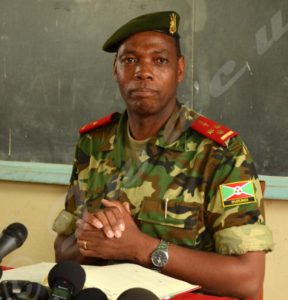
“The AU ensures that every soldier receives USD 828 per month, and that $ 200 are paid monthly to the Burundian government.”
The Bujumbura government reaction came after the information reported on social networks, since 18 October, that the rotation of three Burundian battalions of AMISOM (African Mission in Somalia), has been postponed. “It is quite normal because it has happened several times,” replied Colonel Gaspard Baratuza, spokesman of the Burundian army, without saying anything on the decision of Brussels. The real cause of the non-alternating of Burundian soldiers in Somalia is not well known. But another equally troubling fact is that the EU has paid salary arrears of all the soldiers of the African force, but up to 16 March 2016 when it suspended bilateral cooperation with Burundi government.
The EU reduced by 20% the funding for these contingents in AMISOM. In all cases, Bujumbura asks the AU to respect the Memorandum of Understanding (*) after the postponement of the rotation of three Burundian battalions. “If the contingent’s mandate expires, there will be rotation. Even so, nothing confirms that, because the African Union has already announced the postponement of the rotation, “says colonel Baratuza. He also denies the information which mentions the end of Burundian soldiers’ mission in AMISOM in 2017. The colonel said the memorandum signed between Burundi and the AU doesn’t give details on the duration of the mission of AMISOM troops in Somalia.
The government has clean hands…
In an interview granted to the Chinese news agency Xinhua, Colonel Baratuza denied rumors that the payment of salaries to Burundian soldiers in AMISOM is irregular due to the fault of the Burundian military.
“Indeed, a recent memorandum of understanding governing the relations between the African Union (the AU direct employer of the mission) and the African troop contributors to AMISOM, including Burundi, stipulates that every military receives monthly compensation capped at one thousand and twenty-eight US dollars (1028 USD) from which a withdrawn amount of USD 200 goes to the troop-contributing country, “he said.
Thus, the AU ensures that every military receives USD 828 per month, and that $ 200 are paid monthly to the Burundian government.
For the spokesman of the army, the Burundi government cannot in any way be accused of making withdrawals from its troops’ salaries deployed in Somalia, “because the ad hoc financial operations are made transparently under the terms of the memorandum of understanding between UA and troop contributors.”
According to colonel Baratuza, the government uses the money it receives from the salaries of its troops to improve their conditions of work, including replacing the uniforms and worn out weapons.
A memorandum against another
The withdrawal of the Burundian troops from AMISOM has been longed for by some actors who wished to reduce the Bujumbura repression power.
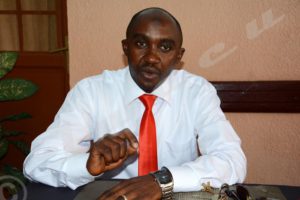
Jérémie Minani: “All Burundian contingents on peacekeeping mission abroad have to be brought back home”.
The civil society organizations engaged in the campaign “Halt to the Third Term” demanded in May 2016 the repatriation of Burundian troops in peacekeeping mission in Somalia. In the memorandum addressed to the African Union, the UN, the European Union and the United States, the organisations showed how “the funds collected by the government in exchange of its contribution to AMISOM are a godsend for President Nkurunziza to maintain repression and his Imbonerakure militia”.
These organizations also said these peacekeeping missions are a “refuge and a reward for criminals”, including soldiers or others who have distinguished themselves by their violence in the repression of the opponents. The memorandum also referred to “corruption and embezzlement of funds” of AMISOM which caused the delay of the troops’ salary payment for six months
Vital Nshimirimana, the chairman of the Forum for Strengthening Civil Society (FORSC) and one of the signatories of the memorandum requesting the withdrawal of Burundian soldiers from AMISOM, recognizes that this peacekeeping mission has long been a major source of funding for Burundi. “But, for years, the funding has become the source of enrichment for the regime. We also know that this mission is used to reward those who have excelled at suppressing the opponents to the 3rd term.”
Vital Nshimirimana considers that if the Burundian Parliament is today interested in this issue, it is a form of blackmail that has always prevailed whenever the partners addressed to Burundi Government not to break the law, to violate the Constitution or the Arusha Agreement. “The current regime has always used blackmail over the management of troops in Somalia which it considers as a business”.
Bujumbura blackmail threat
For him, if the Burundi Parliament expresses compassion for Burundians fallen in Somalia, it is in fact a pretext because of fear of giving accounts: “They know that those troops will come back and that they will not be lied to by those who destroyed the reputation of the country and the army because of their crimes. This has made the international community sideline Burundi, its leaders and its troops”.
The CNARED (main Burundian opposition alliance in exile) remains firm on its position: “all Burundian contingents on peacekeeping mission have to be brought back home”, says Jérémie Minani, in charge of communication of CNARED.
According to him, there is no reason whatsoever to justify the deployment of soldiers and police officers guilty of war crimes, crimes against humanity and genocide acts in their own countries to maintain peace abroad. “We will continue working together with the international community to achieve that objective. At worst, we will make sure that salaries of those soldiers will never pass through the accounts of Burundi government that embezzles them and uses that money to fund its mass atrocities”.
Some of the responses by Emmanuel Ntahomvukiye, Minister of Defense this Thursday 3 November 2016
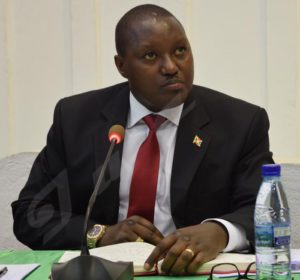 “The EU has reduced by 20% the funds allotted to the African peacekeeping contingents because, the Union has also economic problems”.
“The EU has reduced by 20% the funds allotted to the African peacekeeping contingents because, the Union has also economic problems”.
“The EU has already sent 80% for 10 months, and the conditions of payment are being studied because the agreement in force was about 100%”.
“There needs to be a way so that the 80% continue passing through the same channel; otherwise, the government of Burundi will not allow that”.
“They spoke of the intention of some donors to AMISOM to pay directly the troops, but there has not been any act to prove that. If those salaries don’t pass through the countries that have sent the troops that will create insubordination because you can’t give orders to someone you don’t pay”.
“Withdrawing our troops is the last solution after all the others have failed. For the moment, we want to inform about that question because it is crucial”.
“Negotiations with the AU and other countries that contribute to the deployment of AMISOM troops have started and are going on”.

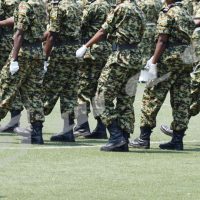
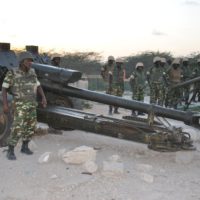
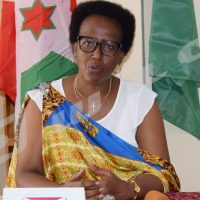
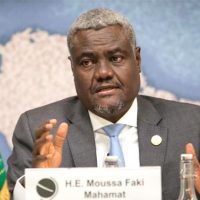













 IWACU Open Data
IWACU Open Data

